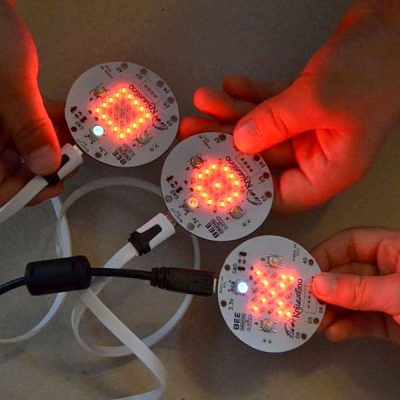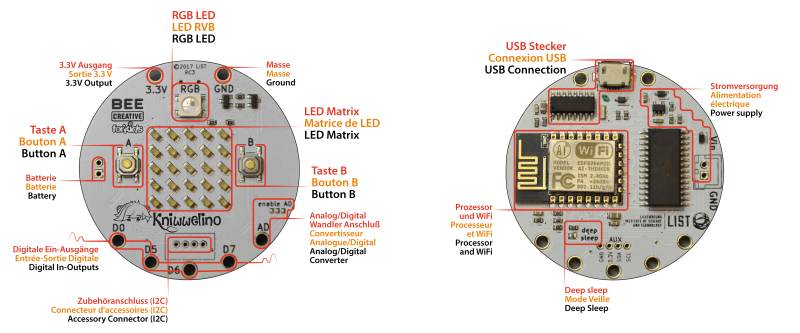Kniwwelino is the latest in a line of micro:bit-inspired projects that we’ve seen, but this one comes with a twist: it uses an ESP8266 and WiFi at the core instead of the nR51 ARM/BTLE chip. That means that students can connect via laptop, cellphone, or anything else that can get onto a network.
That’s not the only tradeoff, though. In order to get the price down, the Kniwwelino drops the accelerometer/magnetometer of the micro:bit for a programmable RGB LED. With fewer pins to break out, the Kniwwelino is able to ditch the love-it-or-hate-it card-edge connector of the micro:bit as well. In fact, with all these changes, it’s hard to call this a micro:bit clone at all — it’s more like a super-blinky ESP8266 development kit.
 So what have they got left in common? The iconic 5×5 LED matrix in the center, and a Blockly visual programming dialect dedicated to the device. Based on the ESP8266, the Kniwwelino naturally also has an Arduino dialect that students can “graduate” to when they’re tired of moving around colored blobs, and of course you could flash the chip with anything else that runs on an ESP8266.
So what have they got left in common? The iconic 5×5 LED matrix in the center, and a Blockly visual programming dialect dedicated to the device. Based on the ESP8266, the Kniwwelino naturally also has an Arduino dialect that students can “graduate” to when they’re tired of moving around colored blobs, and of course you could flash the chip with anything else that runs on an ESP8266.
We don’t have one in our hands, but we like the idea. An RGB LED is a lot of fun on Day One, and the fact that the Kniwwelino fits so neatly into existing bodies of code makes the transition from novice to intermediate programmer a lot easier. These things are personal preference, but WiFi beats Bluetooth LE in our book, for sheer ubiquity and interoperability. Finally, the Kniwwelino comes in at about half the manufacturing cost of a micro:bit, which makes it viable in schools without large manufacturer subsidies. They’re estimating $5 per unit. (Retail is higher.) On the other hand, the Kniwwelino is going to use more juice than its ARM-based competitor, and doesn’t have an accelerometer.
Kniwwelino is apparently derived from a luxembourgish word “kniwweln” that apparently means to craft something. The German Calliope Mini is named after Zeus’ daughter, the programmer’s muse. We’re stoked to see so many cute dev boards getting into the hands of students, no matter what you call them.

















Cool to see Blockly making its way into cheap MCU boards. It seems like there’s a ton of promise for education there.
I want to like Micro:Bit but I can’t see how. It seems to be like a new decade’s version of Parallax products. Friendly enough you could give it to a child to learn with. Expensive enough to ensure that you will never do that.
Maybe there are a bunch of really well funded schools out there with progressive and technically minded teachers. If so then I wish I had grown up there. Can I breathe the atmosphere? Surely such schools don’t exist anywhere on this planet!
Is $15 really expensive?
He probably confused a starter pack with being the actual microbit
“it’s hard to call this a micro:bit clone at all ”
Yep!
Sort of like saying “This Chevy Nova, is a clone of a Ford F-150!”
” (Retail is higher.)”
I’m sure it will be, but more on the level of a “kit” that will include marked up power supply and cables for only 70 Euro while the standalone will be unavailable at 10,08 Euro.
Mmmm that awful kit “deal,” where they snap up all the new pi 3 B+ and jack up the prices almost 3x to sell you a POS plastic case, some tiny heat sinks, a fan with seemingly no bearings at all, a power supply, and a counterfeit ultra-slow SD card.
Thanks guys.
From an educational point of view these are a waste of money and you would be better off getting the students an android tablet, five times the cost but one thousand times the functionality. I’m not being a scrooge or whatever, my kids have a mountain of gear to play with, it is just that these cute little toys just don’t offer much even if they are “cheap”, not that 10,08 € is cheap for most of humanity. If they contained an ESP32 for that price I’d take a second look at them.
An android tablet’s not going to teach hands-on electronics
You’re not trying very hard if you can’t see the advantage to starting out with something a bit more bare bones and simple than a full-on operating system. It’s about learning the basics, not having a thousand times the functionality.
Banans PI : bit is an Esp32 based micro:bit clone https://m.aliexpress.com/item/32861694375.html?trace=wwwdetail2mobilesitedetail&productId=32861694375&productSubject=BPI-bit-Webduino-and-arduino-board-with-EPS32-for-STEAM-education
I bought a Micro:Bit because it included an accelerometer and magnetometer. With those, the price was reasonable for projects that needed them. Without them, there are many alternatives at much lower price for the hacker. Given that, I can’t see who would want this. Anyone looking for an educational device will stick to the Micro:Bit and hackers will use modules like the Pi Zero or a cheap ESP8266 or ESP32 module.